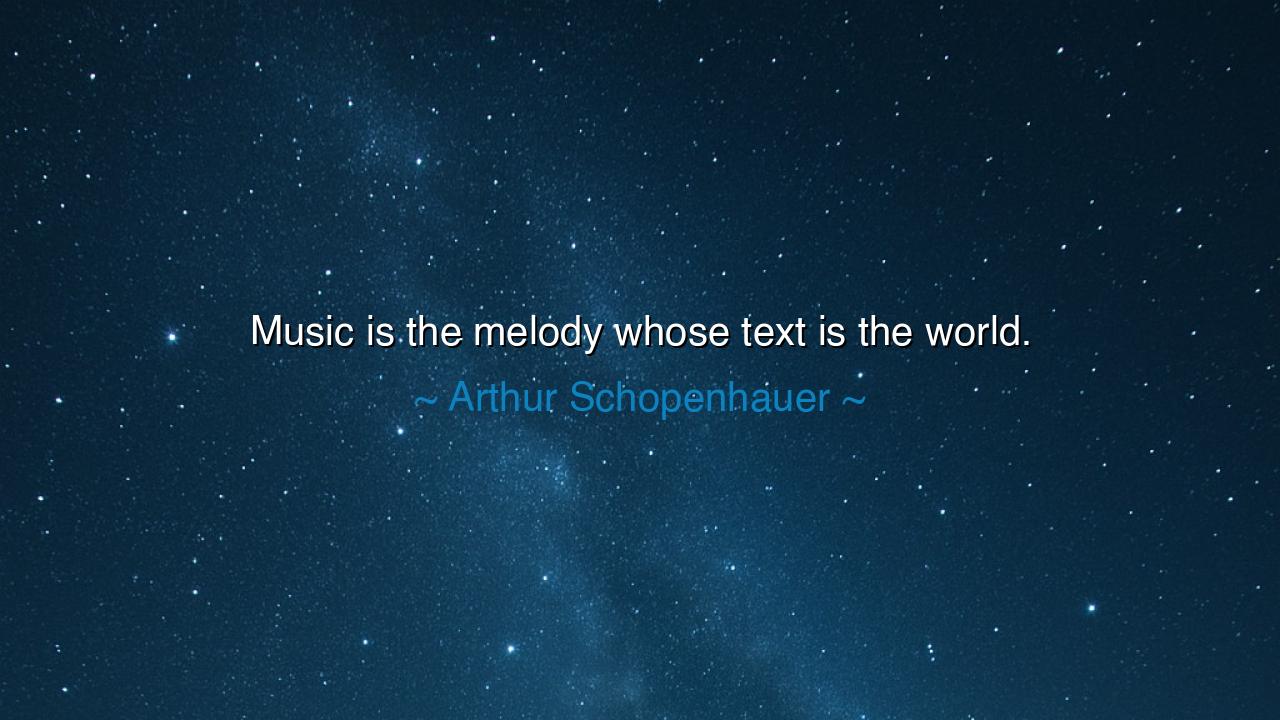
Music is the melody whose text is the world.






The philosopher of will and spirit, Arthur Schopenhauer, once spoke with haunting clarity: “Music is the melody whose text is the world.” In these words, he revealed the profound union between the visible and the invisible, between the life we see and the music we feel. For the world itself, with its sorrows, joys, struggles, and triumphs, is the written text—the outward story. Yet music is the melody, the voice beneath, the hidden spirit that makes the text come alive. Without melody, the text lies silent; without the world, the melody lacks form. Together they reveal the harmony of existence.
The ancients would have understood this well. The Greeks spoke of the music of the spheres, a cosmic harmony in which every planet, every star, contributed to the great unseen symphony of creation. For them, existence was not mere matter, but sound—an eternal resonance flowing through all things. Schopenhauer, echoing this ancient wisdom, declares that life is not just to be read with the eyes, but to be heard with the soul. The world is the script; music is its emotion, its essence, its eternal meaning.
Consider the life of Beethoven, who in the silence of his deafness composed symphonies that carried the full weight of the human spirit. He could no longer hear the world’s text through the ear, yet he still grasped its melody. His Ninth Symphony, with its cry of “Ode to Joy,” did not describe the world in words, but revealed it in sound. Those who listen are reminded that beyond the surface of wars, poverty, and toil, there is still beauty, still transcendence. Beethoven’s music was the melody through which the world’s text was illuminated.
Schopenhauer believed that of all the arts, music stood apart. Painting, sculpture, and poetry imitate the world—they copy its forms and describe its stories. But music does not imitate; it speaks the very language of existence itself. When you hear a melody of longing, it does not tell you of one particular sorrow—it reveals sorrow itself. When you hear a triumphant chord, it does not narrate one specific victory—it speaks of victory itself, universal and eternal. Thus the world is the text, but music, flowing like spirit, is the melody that breathes life into that text.
The deeper meaning of this teaching is that to truly understand life, one must not look only with reason, but listen with the heart. Words, laws, and histories tell us what happened, but music tells us how it feels to live it. In every culture, in every generation, people have turned to song not merely to record their days, but to give them meaning. The lullaby, the battle hymn, the lament, the anthem—all are proof that without melody, the text of the world would be flat, silent, and incomplete.
The lesson for us is powerful: if we would live fully, we must learn to listen for the melody beneath the text. Do not see life only as tasks, burdens, and duties; hear also the music that flows through it—the laughter of children, the rhythm of footsteps, the song of the wind, the harmony of voices joined in unity. For the world is the text, yes—but the soul hears more, the soul hears the melody.
Practically, this means giving space for music in our daily lives, not only as background, but as sacred practice. Listen to music that awakens your spirit; let it remind you that your story is not isolated, but part of a greater song. Create music, if only in simple humming, to give voice to your inner truth. And when life seems heavy, remember Schopenhauer’s wisdom: the world may be the text of struggle, but the melody of existence is still playing.
Thus, let these words endure: music is the melody whose text is the world. The world writes its stories in matter, in history, in flesh and stone. But music is the soul’s translation of that story, carrying it to the depths of human feeling and the heights of transcendence. To live wisely, then, is to read the world with your eyes, but to hear its melody with your soul—and in that harmony, to discover the meaning of life itself.






AAdministratorAdministrator
Welcome, honored guests. Please leave a comment, we will respond soon